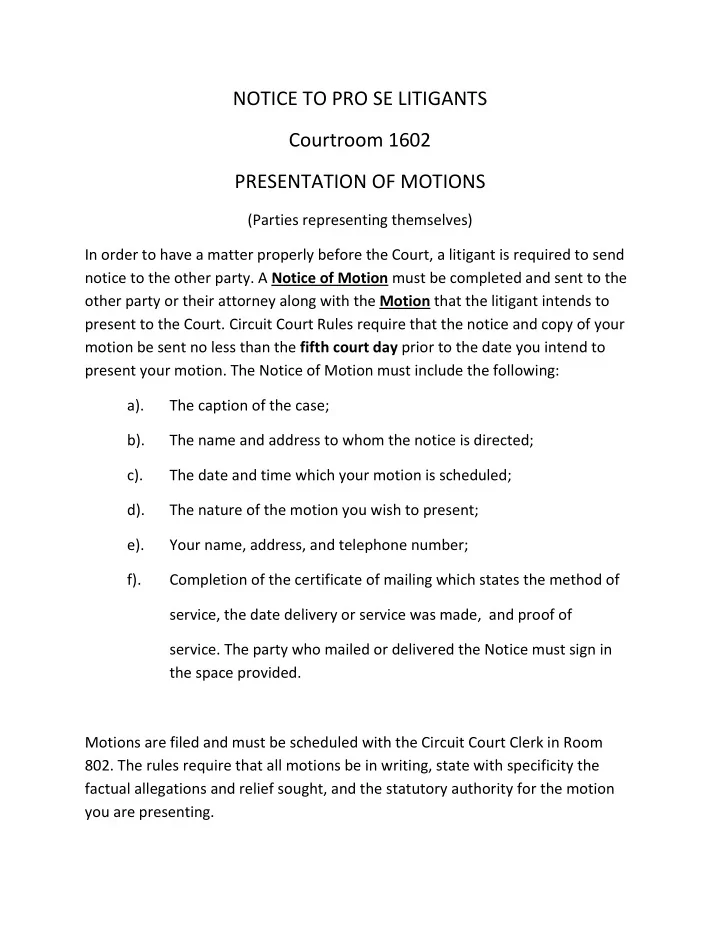

NOTICE TO PRO SE LITIGANTS Courtroom 1602 PRESENTATION OF MOTIONS (Parties representing themselves) In order to have a matter properly before the Court, a litigant is required to send notice to the other party. A Notice of Motion must be completed and sent to the other party or their attorney along with the Motion that the litigant intends to present to the Court. Circuit Court Rules require that the notice and copy of your motion be sent no less than the fifth court day prior to the date you intend to present your motion. The Notice of Motion must include the following: a). The caption of the case; b). The name and address to whom the notice is directed; c). The date and time which your motion is scheduled; d). The nature of the motion you wish to present; e). Your name, address, and telephone number; f). Completion of the certificate of mailing which states the method of service, the date delivery or service was made, and proof of service. The party who mailed or delivered the Notice must sign in the space provided. Motions are filed and must be scheduled with the Circuit Court Clerk in Room 802. The rules require that all motions be in writing, state with specificity the factual allegations and relief sought, and the statutory authority for the motion you are presenting.
Sample pleadings are available at the Law Library on the 29 th floor. In addition, on line assistance in preparing certain motions and pleadings is available at www.illinoislegalaid.org. Oral motions are prohibited and the Court is not allowed to entertain matters not properly plead in the motion. A Motion is a request by a litigant asking the Court for some form of relief under the Illinois Marriage and Dissolution of marriage Act or the Illinois Domestic Violence Act. If your motion is asking for the modification or enforcement of a prior order, a copy of that order must be attached to your motion . Some of the most common types of Motions are: a). Motion for Temporary Child Support. 750 ILCS 5/501 and 505 b). Motion for Temporary Maintenance 750 ILCS 5/504 c). Motion for Modification of Child Support/Maintenance 750 ILCS 5/510 d). Motion for Temporary Parenting Time 750 ILCS 601, 602 e). Motion for Modification of Allocation of Parental Responsibility. 750 ILCS 5/601,602,610 On the date your matter is set, please be prepared to provide the Judge with a file stamped copy of your Motion and Notice of Motion. Do not assume that the Judge will have a copy of your Motion when you step before the bench. If prior orders have been entered in your case, it is a good practice to bring copies of all court orders with you on each and every court appearance. If the matter is properly before the Court, the Judge will review the pleadings and ascertain how the matter will proceed. If the motion is being contested by the other party, the Court will, in most cases, set the matter for hearing on some future date. If you are responding to a motion filed by the other party, you will be allowed to file a written response, if you so choose, within a time period set by the Court.
At the hearing on the Motion, the moving party will present his/her motion and is responsible for submitting evidence in support of the motion. The responding party will then present evidence in support of his/her position if respondent so chooses. Any witnesses who either party seeks to testify must be in court on the day of the hearing. In virtually all cases, the written statement of a witness cannot be considered by the Court as evidence at a hearing. Please remember the following: 1. The Judge cannot give you legal advice as to how you should present your case nor can the Judge assist you in presenting your case. The Judge must remain impartial. 2. The Court Staff are statutorily prohibited from giving you any legal advice. Please do not consider their refusal to answer your question concerning your matter as their refusal to be helpful to you. The clerk is responsible for maintaining the court files and calling the cases and the deputy sheriff is responsible for maintaining order in the courtroom. 3. Although you are representing yourself, the Code of Civil Procedure, Supreme Court Rules, and the Rules concerning the admissibility of evidence must be applied by the Court. 4. Decorum must be maintained in a court of law. This means that hearings will be conducted in an orderly fashion. The parties will address the Court and not one another. Neither party will be allowed to interrupt the other party during the presentation of their case unless a legal objection is posed. Both sides will be afforded an opportunity to speak and present their side of the case. Failure to maintain order by either or both parties may result in the imposition of sanctions by the Court. 5. Please be prepared on the day of your hearing. Continuances will not be granted without compliance with Circuit Court Rules. Judge Edward A. Arce
Recommend
More recommend